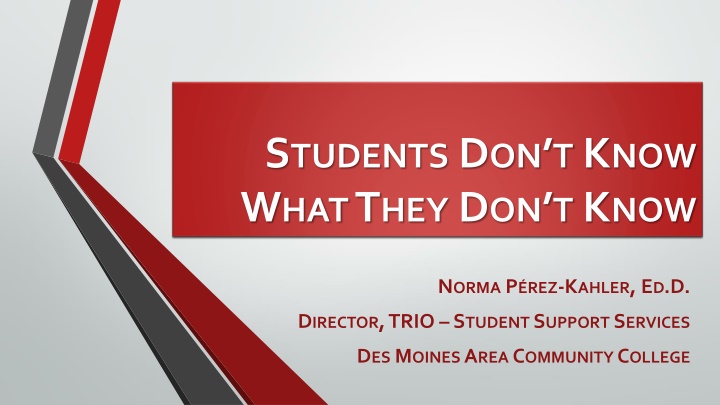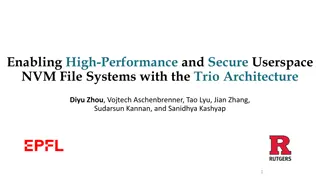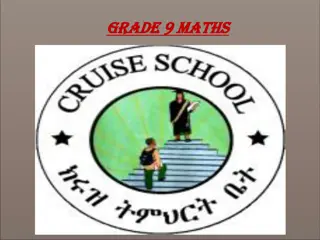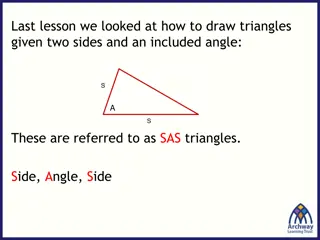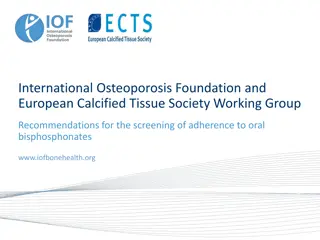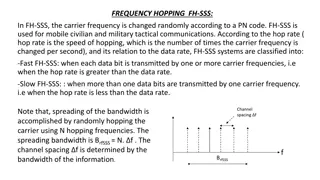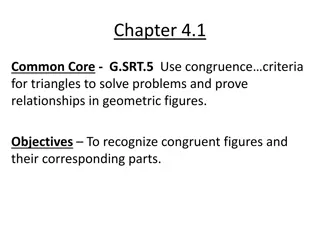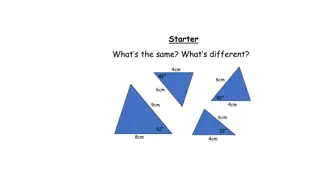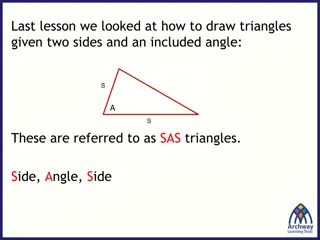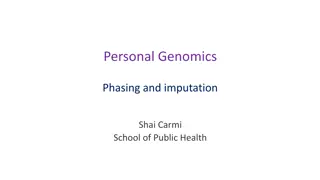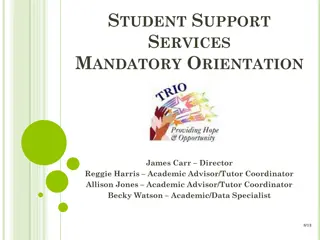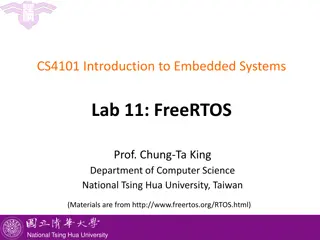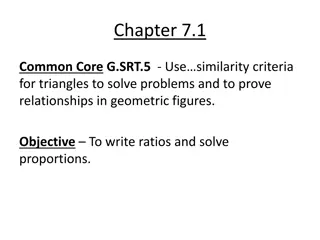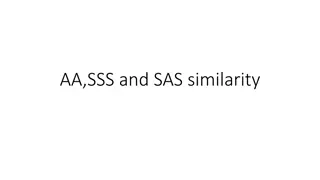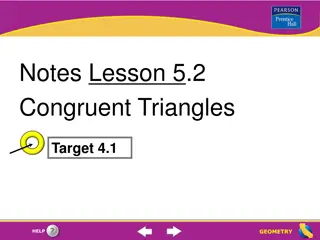TRIO/SSS Program Overview
Student Support Services is a TRIO Program under Title IV of the 1965 Educational Opportunity Act, offering educational opportunity assistance for college success. The program targets underrepresented student populations, providing academic and personal skills development, guidance on educational goals, campus resource knowledge, and support for degree completion.
Download Presentation

Please find below an Image/Link to download the presentation.
The content on the website is provided AS IS for your information and personal use only. It may not be sold, licensed, or shared on other websites without obtaining consent from the author.If you encounter any issues during the download, it is possible that the publisher has removed the file from their server.
You are allowed to download the files provided on this website for personal or commercial use, subject to the condition that they are used lawfully. All files are the property of their respective owners.
The content on the website is provided AS IS for your information and personal use only. It may not be sold, licensed, or shared on other websites without obtaining consent from the author.
E N D
Presentation Transcript
STUDENTS DONT KNOW WHATTHEY DON T KNOW NORMA P REZ-KAHLER, ED.D. DIRECTOR, TRIO STUDENTSUPPORTSERVICES DES MOINESAREACOMMUNITYCOLLEGE
WHAT IS SSS? Student Support Services is a TRIO Program, an acronym for federally funded education programs offered under Title IV of the 1965 Educational OpportunityAct. TRIO programs are: Upward Bound, Talent Search, Educational Opportunity Centers, McNair Scholars andStudent Support Services. Specifically, TRIO/Student Support Services provides educational opportunity assistance for college success. To qualify students must meet one or more of the following criteria: Low-income students First-generation college students (neither parent has earned a four-year degree) Documented physical or learning disability
TRIO/SSS Overcoming Challenges, Moving Students FORWARD Our Mission: The directive of the TRIO/Student Support Services program is to provide underrepresented student populations with the added support mechanisms needed to meet the challenges of higher education. Through the development of academic and personal skills, the program focuses on deepening critical thinking competencies, increasing student persistence, and promoting degree completion.
BENEFITS OF MEMBERSHIP IN TRIO/SSS INTRUSIVE ACADEMIC ADVISING & COACHING: INTENTIONAL, INDIVIDUAL AND IN-DEPTH ASSISTANCE Understanding of students challenges at school and beyond Guidance to establish and manage students educational goals Support to learn about program requirements and course selection Career Assessment Comprehensive knowledge of the campus resources Referrals to other appropriate services.
BENEFITS OF MEMBERSHIP IN TRIO/SSS INTRUSIVEACADEMICADVISING & COACHING: INTENTIONAL, INDIVIDUALAND IN-DEPTHASSISTANCE Foster sense of community Help students develop meaningful relationships with faculty and peers Encourage connections at various institutional levels Provide comprehensive assistance to develop academic r sum and personal essay Information, support and referral for internship & scholarship applications
BENEFITS OF MEMBERSHIP IN TRIO/SSS TRANSFERASSISTANCE FOR STUDENTS WHO ARE PLANNINGTOTRANSFERTO A FOUR-YEAR INSTITUTION OR PROFESSIONAL SCHOOL, SSS PROVIDES: Information about Application processes and requirements Tuition, housing, scholarships and other fees Visits to colleges and universities Organize transfer fairs at Urban Campus, and Personal advising about the transferring process as a whole
BENEFITS OF MEMBERSHIP IN TRIO/SSS FINANCIALAIDASSISTANCE: Help submitting the FAFSA form, Advice about decisions that affect students financial aid (now and in the future) Financial Literacy Assessment & Workshops that explain the financial aid system and the variety of funding choices available to students.
BENEFITS OF MEMBERSHIP IN TRIO/SSS THE SUCCESS LAB TWO PART-TIME LABASSISTANTS, WHO ARE ALSO ADJUNCT INSTRUCTORS AT DMACC TENTOTWELVE PEERTUTORS HIREDTHROUGHTHEWORK-STUDY PROGRAM WORK 4-9 HOURS PERWEEK HAVE B+ OR BETTER INTUTORING SUBJECT AREAS MAJORITY ARESSS PARTICIPANTS ROLE MODELS/PEER MENTORS
BENEFITS OF MEMBERSHIP IN TRIO/SSS SUCCESS LABSERVICES: SUPPORTIVE ENVIRONMENT INDIVIDUAL AND GROUPTUTORING AND SUPPLEMENTAL INSTRUCTION ASSISTANCE RESOURCE ROOM & COMPUTER LAB PLACETO STUDY, RESEARCH, CHECK EMAIL, PRINT PAPERS, AND MUCH MORE TRIO/SSS FAMILY = MICROCOMMUNITYWITHIN DMACC URBAN
BENEFITS OF MEMBERSHIP IN TRIO/SSS SKILL-DEVELOPMENTSEMINARS/WORKSHOPS MONTHLY SESSIONSWHICH ADDRESSTOPICS PERTINENTTO STUDENTS ACADEMIC AND PERSONAL SUCCESS CULTURAL ANDSOCIAL ENGAGEMENT EVENTS FREE OF CHARGE TO OUR MEMBERS ATTENDSTUDENTCONFERENCES DEVELOP LEADERSHIP SKILLS
STUDENTS DONT KNOW WHAT THEY DON T KNOW! First-generation students (and others) have unique needs and expectations: Absence of role models and guidance along the way Lack of trust in society others different from themselves Feel the pressure to succeed (way out) Feel isolated the only one experiencing all that lack of knowledge Do not know what to expect No one to answer questions and help them navigate the system
STUDENTS DONT KNOW WHAT THEY DON T KNOW! Students with unique needs and expectations: Not used to making financial decisions that impact their future Unsure how to establish academic goals or personal goals Misperception on how to choose the right major and how to set academic objectives Do not know the resources available to them and their needs Need individualized attention Do not know how to gain true ownership of their education
HOW CAN FACULTY SUPPORT THE WHOLE STUDENT They turn to advisors and/or faculty for answers, guidance and support Understand their unique needs and expectations Understand and learn about their background, family structure, and support system (or lack of) Sensitivity to their lack of trust in the system Institutional responsibility everyone at institution can assist in their success and needs to be prepared to help Institutional support address the needs and issues of all students keep them engaged = persistence and completion
HOW CAN FACULTY SUPPORT THE WHOLE STUDENT First-generation students (and others) have unique needs and expectations: Establish community Stay attuned to students Develop individual connections Create positive we can do environment Be a sympathetic professor remember what it was like when we went through the college experience Help students establish not just academic goals but also personal goals needed to support their academic objectives
WHAT RESEARCH SHOWS Komives and Woodard (2001) indicate that 'one of the most powerful positive influences on students' persistence in college is individual attention' Individual support and institutional responsiveness are also powerful factors in student persistence Students who feel connected and engaged will persist and be more successfulin college Research (Campbell & Campbell, 1997; Kuh& Hu, 1991) shows that student- faculty relationships are crucial during a student s time in college Good relationships with faculty help students feel connected with the institution One of the responsibilities of a good advisor/coach is to help students develop those relationships with faculty and encourage connections at various institutional levels
WHAT RESEARCH SHOWS Faculty are often among the first to notice when students are experiencing problems and sometimes those are problems we are not able, nor qualified, to address To help our role in addressing students needs, develop a list of information/links to the resources our institution provides: academic advising and coaching peer tutoring and study groups specific schedules, location and subjects walk-in and individual tutoring location of center supplemental instruction information (seminars schedules/handouts) on: note-taking; time-management; test anxiety; exam preparation; stress management; r sum /interviewing, dinner etiquette; balancing life: work, family, academics and fun; self-care, mental health, etc. academic organizations and student clubs, local chapters of national/state organizations for college access and success mental health counseling and resources
TABLE DISCUSSIONS: Based on information above, what can we do better to support the whole student? as Faculty? as Institution? as Alliance?
RESOURCES The Ohio State University Center for Higher Education Enterprise - CHEE's primary activities include research, policy analysis, and outreach that will help make higher education more accessible, affordable, engaged and all-around excellent. Click the images below to learn more about CHEE's focus areas. http://chee.osu.edu/who-we-are/about-chee.html https://chee.osu.edu/what-we-do/resources/students-of-color-in-stem.pdf https://chee.osu.edu/what-we-do/resources/black-male-collegians.pdf
RESOURCES NACADA http://www.nacada.ksu.edu/ https://www.heacademy.ac.uk/resources/detail/inclusion/wprs/WPRS_retention_synthesis http://nsse.indiana.edu/pdf/NSSE2005_annual_report.pdf Education Advisory Board https://www.eab.com/areas-of-expertise/student-success Center for Student Opportunity (CSO) http://www.imfirst.org/ I m First: RPGroup: www.rpgroup.org/projects/student-support http://rpgroup.org/sites/default/files/StudentSupportRedefined- 10WaysFacultyCanSupportStudentSuccess-Summer2013.pdf
